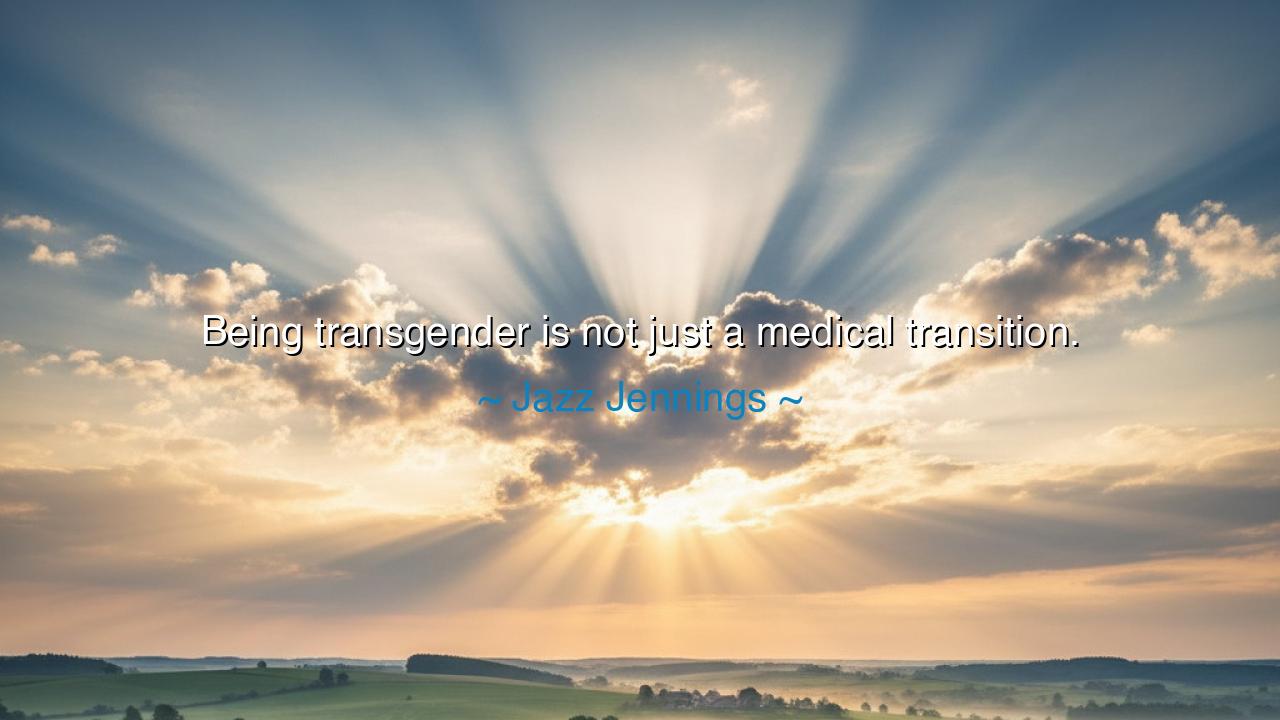
Being transgender is not just a medical transition.






"Being transgender is not just a medical transition," says Jazz Jennings, and within these words lies a profound truth about the journey of identity, transformation, and the complexities of the human experience. Jazz speaks not just of the physical act of transitioning but of the deeper, more intricate processes that shape one's true self. To be transgender is not solely defined by the external changes one makes to their body, but by the internal transformation of the spirit—an evolution of identity, an embrace of one's truth, and a courageous self-discovery. Medical transition is only one part of the path; the heart, mind, and soul must also undergo their own profound shifts to align with the truest form of oneself.
In the ancient world, there were many who sought to define themselves not by the bodies they were born into, but by the souls that called them to something greater. Consider Achilles, the great Greek warrior, whose name became synonymous with bravery and strength. Yet, even in his mythic deeds, Achilles was more than his outward appearance; he was a figure of internal struggle, torn between his desire for honor and the deep awareness of his own mortality. Achilles’s journey was not just a physical battle, but an internal reckoning with what it meant to be truly human. His story reminds us that one’s identity transcends the physical form and is rooted in the spirit and the choices one makes in the face of inner conflict.
Transgender individuals, like Jazz Jennings, embark on a similar journey of self-realization. The external transition—whether through hormonal therapy, surgery, or other forms of medical intervention—does not mark the full scope of the journey. It is a courageous act, yes, but it is the internal work of embracing one's true self, of shedding societal labels and embracing an authentic identity, that defines the true transition. Just as the ancient warriors and sages faced internal battles and sought to define themselves by their essence, so too do those who are transgender navigate the complex path of reconciling their inner truth with the expectations of the world around them.
The story of Joan of Arc, for example, is one of both external transformation and profound internal clarity. A young woman who dressed as a man and led an army to victory, Joan’s journey was not simply a change in appearance, but a deep alignment of her soul with her divine calling. Joan’s transformation was one of purpose, driven by the conviction of her identity as a leader, a warrior, and a messenger. In her, we see that true transformation goes beyond the physical; it is the melding of internal and external forces that brings a person into full alignment with their purpose in the world.
In the same vein, Jazz Jennings reminds us that being transgender is not merely a physical transition; it is an awakening of the self—a reclamation of one’s authenticity and a pursuit of harmony between the body and the soul. This is why the journey cannot be simplified to medical procedures alone. The emotional and psychological aspects of the transition are just as important. The pain of misalignment, of not being recognized as one’s true self, is a heavy burden that only true self-acceptance can alleviate. The journey of transitioning is not linear; it is a deeply personal evolution that asks the individual to face their innermost fears and to claim their right to live as they truly are.
The ancients understood the importance of living in alignment with one’s true nature. Socrates, the great philosopher, spoke of the journey to self-knowledge as the highest form of living. "Know thyself," he declared, understanding that the deepest wisdom comes not from external achievements or societal recognition, but from an understanding of one’s inner truth. Jazz Jennings, like many others, walks this path of self-discovery, learning to accept and express her truest self, regardless of the societal pressures to conform. Her courage reminds us that self-knowledge, not external conformity, is the true path to peace and authenticity.
The lesson, then, is clear: being transgender is not about the medical transition alone, but about the totality of the self—mind, body, and spirit—coming into alignment. Just as the warriors of old were not defined solely by their physical prowess but by their inner strength and clarity of purpose, so too must we recognize that true transformation is about more than external changes. It is about the journey to authenticity, the courage to be oneself, and the deep peace that comes from living in full harmony with one's true identity.
As we reflect on this, let us take to heart the wisdom of those who have gone before us—those who have bravely sought to define themselves by their truth and not by the labels imposed upon them. Whether in our own lives, or in support of others on their path, let us strive for a deeper understanding of identity, and recognize that true transformation requires much more than external change. It is the alignment of soul, mind, and body, and it is in this journey that we find our fullest potential and purpose.






AAdministratorAdministrator
Welcome, honored guests. Please leave a comment, we will respond soon